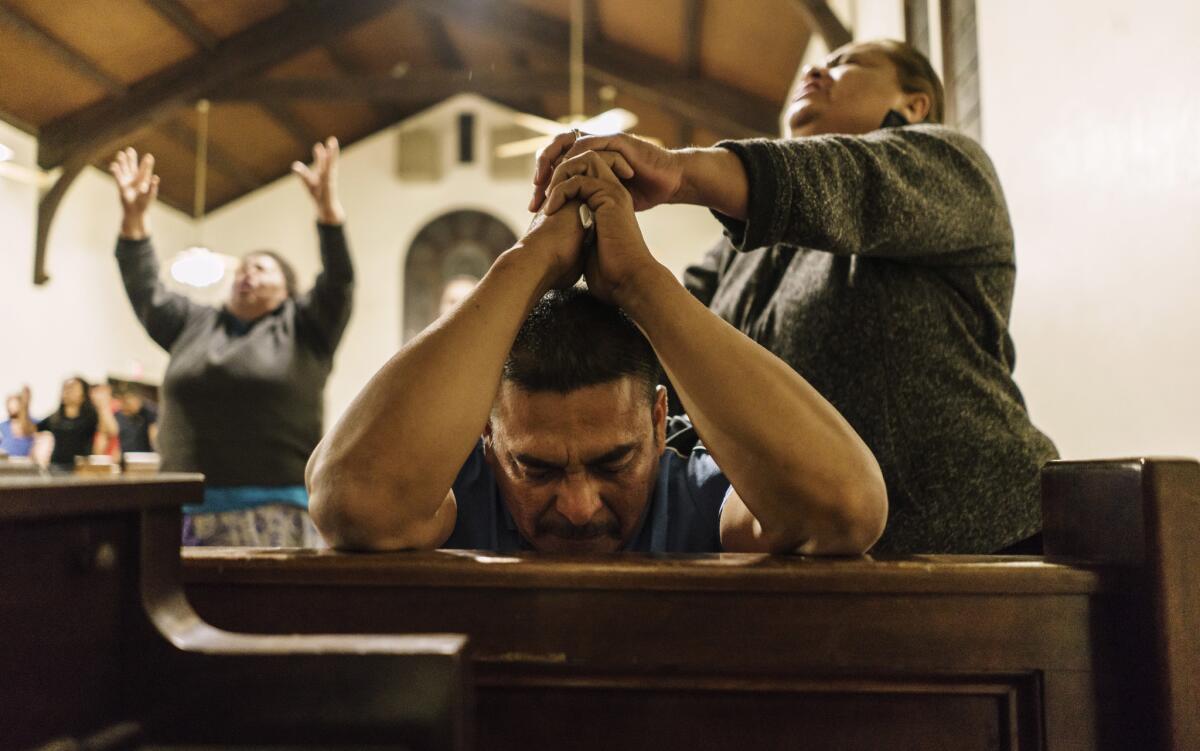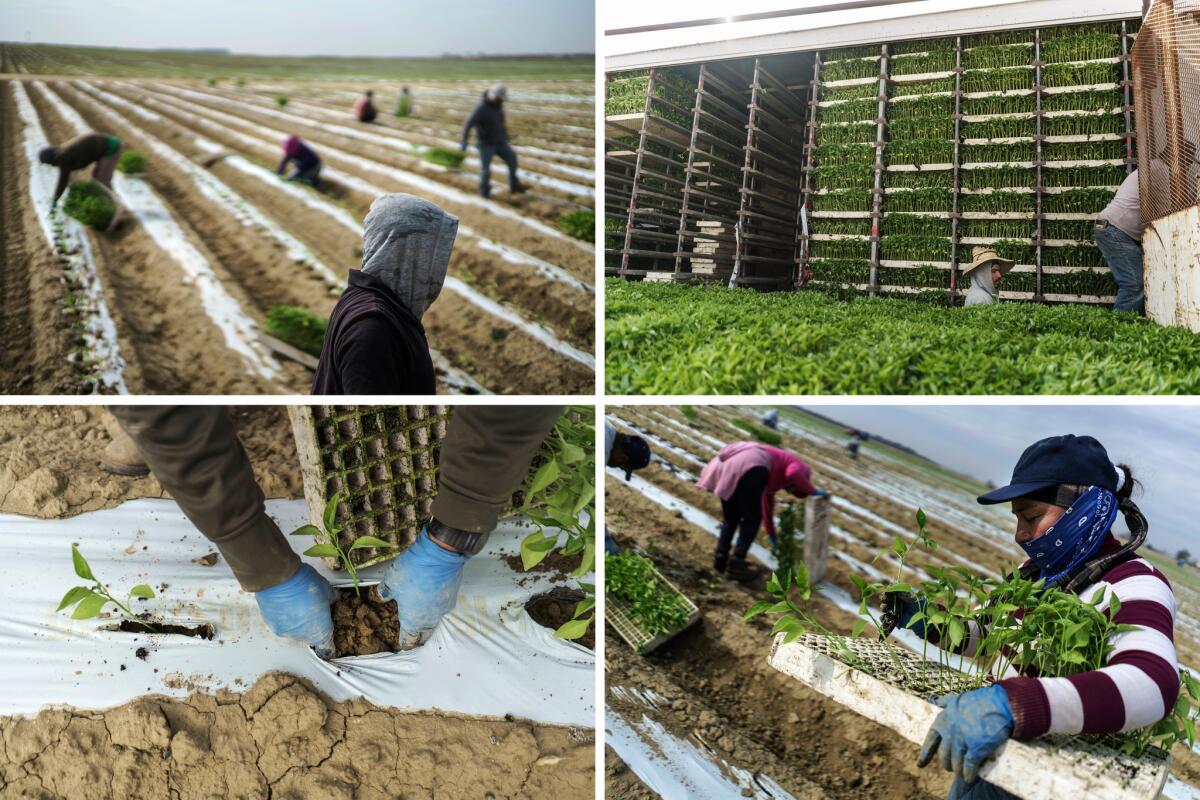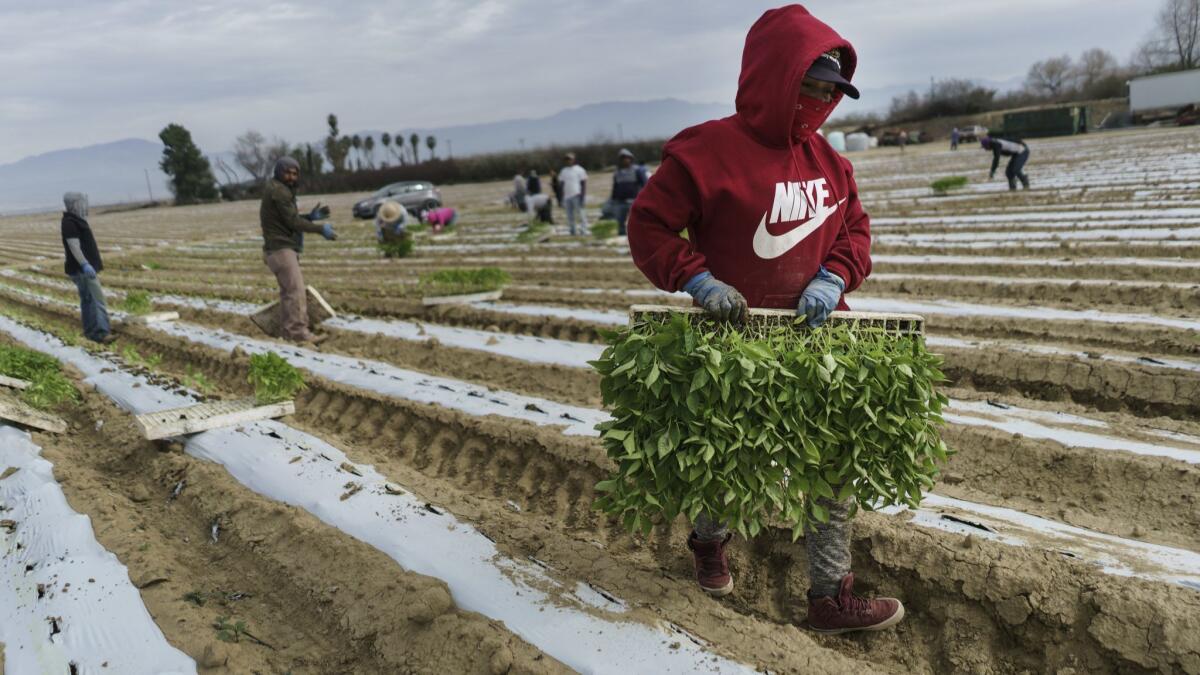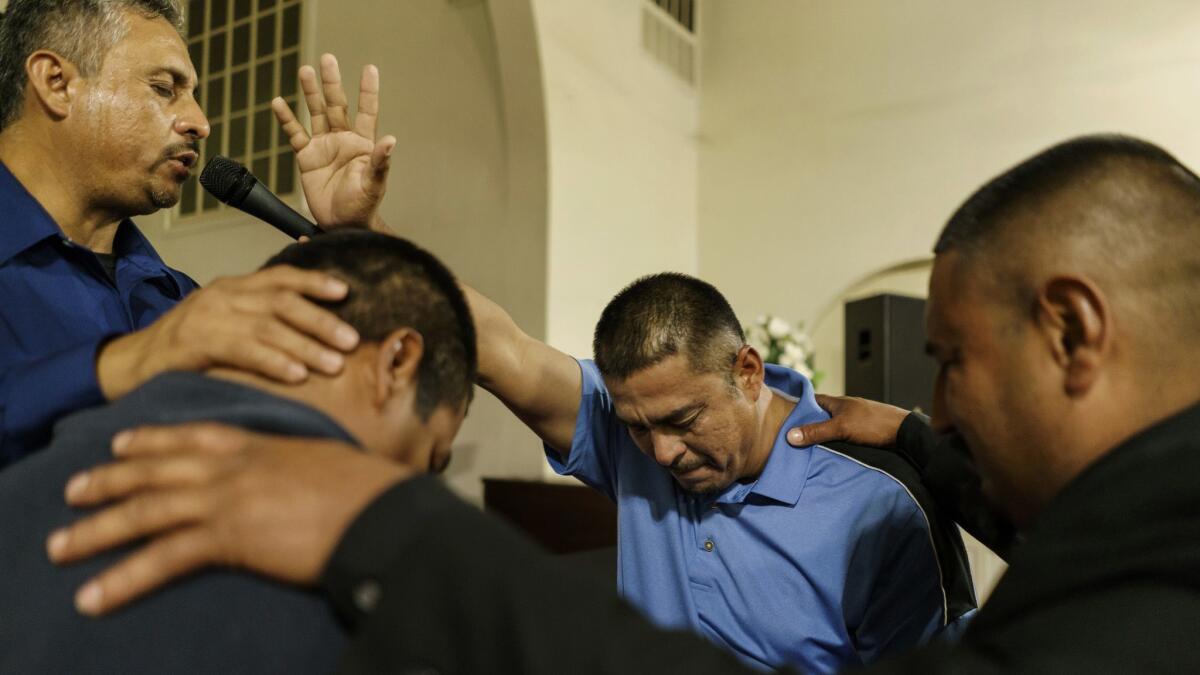ICE arrests farmworkers, sparking fears in the Central Valley over immigrants and the economy

Jesus Aceves was driving three of his fellow farmworkers to the tomato fields in the early-morning darkness when he saw lights flash behind him.
ICE agents pulled him over and asked for his license, registration and insurance and, most forebodingly, whether the men were in the United States legally.
Aceves and his passengers were taken to an immigrant detention facility. But none of them had been the target of Immigration and Customs Enforcement.
Three of the men had no criminal records. The most serious blots on the 44-year-old Aceves’ record were several convictions — the most recent in 2012 — for driving without a license.
That morning, an ICE spokesman said, agents went to a Kern County residence where they thought an immigration target lived. One of the men who got into Aceves’ car matched that person’s description, he said. The ICE agents followed.
The arrests were part of a larger sweep in California’s agricultural heartland that has sent fear through the Central Valley, where for generations, immigrants here — both legally and illegally — have picked crops. In some fields, almost all of the foreign workers are in the country without legal status.
While many immigrants have been on edge since President Trump vowed a crackdown on illegal immigration, the recent sweeps have been particularly concerning because they included the arrests of people not specifically targeted by ICE.
The concern extends to farmers, who fear more sweeps will drive away labor at a time when some are struggling to get enough workers to pick the crops.
Manuel Cunha Jr., president of Nisei Farmers League, which represents agricultural employers and their workers throughout the state, said farmers are worried about losing trusted workers. He said the increasingly tense relationship between the Trump administration and California, which declared itself a “sanctuary state,” has upped the anxiety.
“They’re not going to be replaced by American workers,” Cunha said. “Don’t punish the businesses. We’re not the ones that came up with the sanctuary state.”
In the February sweep across the Central Valley, 232 people were arrested. Of those, 180 were either convicted criminals, had been issued a final order of removal or had been previously removed from the U.S. and returned illegally.
The United Farm Workers of America identified at least 26 farmworkers arrested in Kern, Tulare and Madera counties, most of them stopped before dawn on their way to work.

ICE Director Thomas Homan has said that immigrants who have entered the U.S. illegally “should be afraid.”
He warned that California’s so-called sanctuary policies, which limit the cooperation between local and federal law enforcement, give the agency no choice but to make arrests in neighborhoods and at work sites. That leads to the arrests of other immigrants in the country illegally who are not intended targets, he said.
“This is a prime example of how sanctuary policies, which have pushed ICE out of jails, force our officers to conduct more enforcement in the community — which poses increased risks for law enforcement and the public,” Homan said in a statement to The Times. “It also increases the likelihood that ICE will encounter other illegal aliens who previously weren’t on our radar. It is nonsensical to demand that ICE solely focus on criminals, while simultaneously preventing ICE from arresting criminal aliens inside the secure confines of local jails.”
Win Eaton, an attorney in Bakersfield, is representing some of the detained farmworkers in immigration court.
“It’s just terrible that these people are going to be used as pawns,” he said.

On an overcast day a week after the immigration sweep, 33 workers pulled cases of jalapeño sprouts off a truck and transplanted them into tilled soil at a farm in Lamont, Calif.
Some workers said they had altered their driving routes, taking back roads instead of main highways. Many stayed tuned to Facebook groups dedicated to confirming sightings of immigration agents and reminding people of their rights.
In the early afternoon, Melitón Ferred took a water break. His lower back ached after hours of work. Ferred, who emigrated from Veracruz 13 years ago, said just being a Latino — and particularly one working in the fields — made him feel like a target.
“Who is going to work the fields? No one,” he said. “This is a difficult job, and all of us are from Mexico.”
Alejandra Galacia, 35, said she hardly left her home, not even to buy groceries, the week of the February arrests. The Lamont resident said she worried about being separated from her three young daughters.

She sat them down and told them they would all go back to Mexico together if she was deported. But her oldest daughter, who was born in Mexico and is a junior in high school, has dreams of becoming an oncologist. She told her mother she does not want to return the country of her birth.
“I leave everything in God’s hands,” Galacia said.
Dozens of workers have fled since immigration agents began checking employee records at San Joaquin Valley farms. ICE said 77 businesses — in the jurisdiction that includes Northern California, Hawaii, Guam and Saipan — were served with employment authorization audit notices in January.
Farmers have struggled in recent years with labor shortages. A summer 2017 survey by the California Farm Bureau Federation showed that 55% of responding farmers experienced shortages, with problems most acute among those whose crops require intensive hand labor, such as tree fruits and grapes.
Phil Martin, professor emeritus of agricultural and resource economics at UC Davis, said while that’s true, it would take a huge, targeted immigration operation to really put a dent in the agricultural industry. That’s because production requires so many workers and the industry is using more and more people from a temporary guestworker program.
It also would take more deportation officers. While Trump last year pledged to hire 10,000 new ICE agents, Congress has yet to appropriate money for the hiring process.

Aceves, who was arrested while picking up coworkers in Wasco, Calif., spent just under a week in detention. He was released after his family posted an $8,000 bond. He could wait years before facing a judge because of a massive immigration court backlog.
Two other men in his car also were released after posting bond. The fourth man, Alfredo Diaz, voluntarily returned to Mexico after having lived illegally in the U.S. for more than two decades.
The night after his release, Aceves attended a local church service at El Aposento Alto, where his brother Guillermo Aceves has been pastor for eight years.
Guillermo, 46, told the congregation that what happened to his brother could happen to anyone. If ICE knocks on the door, don’t answer, he said. You have the right to stay silent. Don’t sign anything.
He urged them to decide who would care for their children if they were detained and to save money in case they need to pay a bond.
“These are things we don’t like to talk about because there’s so much fear,” he said. “But you have to do it. You have to make a plan.”
Jesus Aceves has been in California for two-thirds of his life, having come to the U.S. when he was 17. He has three U.S.-born children. From the pulpit, he tearfully talked about spending his days at the Adelanto Detention Facility thinking of his kids and his wife.
“I didn’t expect this. I never thought it would happen to me,” he said.
Guillermo Aceves obtained citizenship through the Immigration Reform and Control Act of 1986. But younger brother Jesus arrived in the U.S. years later and missed out on President Reagan’s amnesty. Now his future is more uncertain than ever.
Toward the end of the service, Jesus stood in a circle with one of the other farmworkers arrested with him that late February morning. He raised his right arm in praise and shut his eyes tight as his brother led the congregation in prayer.
Sign up for Essential California
The most important California stories and recommendations in your inbox every morning.
You may occasionally receive promotional content from the Los Angeles Times.








